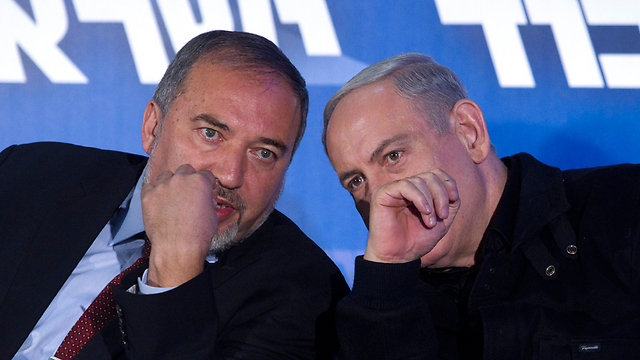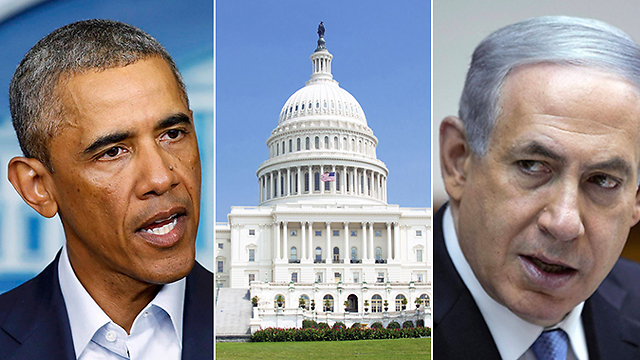
Lieberman to PM: Begin didn't make speeches before destroying Iraq reactor
Yisrael Beiteinu leader downplays significance of Prime Minister Netanyahu's planned US speech on Iran nuclear program, urges firm stance on Iran.
Yisrael Beiteinu chairman Avigdor Lieberman made comments Friday night downplaying the significance of Prime Minister Benjamin Netanyahu's planned speech before Congress next month about the threats of Iran's nuclear program.
"In two previous occasions, when Menachem Begin made the decision to destroy the Iraqi nuclear reactor, there were no speeches or public debates. We woke up one morning – and there was no reactor. The same goes for what we read in the press about Syria. We woke up one morning and the reactor was gone. No speeches or tales were involved," Lieberman said, speaking to Channel 2 News on Friday.
The foreign minister added, "it's not my place to analyze the prime minister and he is familiar with and knows the international arena just as well as I do. It doesn't seem right to hand out grades to Netanyahu less than a month before elections, but just as in previous occasions, ultimately it is our responsibility and we have to make decisions."
Commenting on differences between Israel and the US over Iran, Lieberman said: "With all due respect to the US government, this is our issue and our responsibility. We need determination here, and have to stop with the constant whining. No agreement will prevent Iran from obtaining nuclear weapons. We must decide and act accordingly."
The conflict between Israel and US over the Iran nuclear talks took another turn this week when the White House said that Israeli officials had mischaracterized US negotiations on Iran's nuclear program and criticized what it called "a continued practice of cherry-picking" and leaking information out of context.
White House spokesman Josh Earnest said the Obama administration is mindful of the need to keep the negotiations private and accused Israel of distorting the US' position.
"I think it is fair to say that the United States is mindful of the need to not negotiate in public and ensure that information that's discussed in the negotiating table is not taken out of context and publicized in a way that distorts the negotiating position of the United States and our allies," Earnest said at a news briefing.
"There's no question that some of the things that the Israelis have said in characterizing our negotiating position have not been accurate," he added. "There's no question about that."
He also denied reports that Washington is limiting the information it gives Israel about the Iran talks. "I know that there were some initial reports that indicated that the United States is no longer communicating with our allies in Israel about the ongoing negotiations with Iran. That obviously is false," Earnest said.
"There are any number of meetings that have taken place in recent weeks and are scheduled for the weeks ahead that indicate the continued close communication and coordination between US national security officials and their Israel counterparts," he added.
State Department spokeswoman Jen Psaki, speaking to reporters on Wednesday, also accused Israel of "selective sharing of information" but declined to say what information had been cherry-picked.
"I think it is safe to say not everything you are hearing from the Israeli government is an accurate reflection of the details of the talks," Psaki said.
The negotiations between the United States, Russia, China, France, Germany, Britain and Iran have reached a crucial stage, as the countries previously agreed to deliver a basic framework agreement by the end of March and a final agreement due by June 30.
Earnest would not discuss details of US-Israeli consultations on Iran nuclear negotiations.
"But I think it is fair to say that the United States is mindful of the need to not negotiate in public and ensure that information that's discussed in the negotiating table is not taken out of context and publicized in a way that distorts the negotiating position of the United States and our allies," he said.












